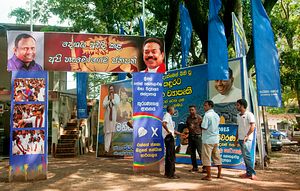Sri Lanka will today hold its seventh presidential election, two years ahead of schedule in what is being touted as the country’s most tightly contested and significant election in decades. Pitted against third-time presidential contender Mahinda Rajapaksa is his former associate Maithripala Sirisena, who is backed by a rainbow coalition of nearly 40 political parties representing all of Sri Lanka’s ethnic communities, including the Buddhist Jathika Hela Urumaya party, or National Heritage Party, and the country’s main ethnic Tamil party, the Tamil National Alliance.
With charges of nepotism, corruption, and abuse of power haunting Rajapaksa’s track record of nearly a decade of governance, a growing number of Sri Lankans are viewing Sirisena’s candidacy as a genuine chance to salvage democracy. At the start of his campaign, Sirisena promised to dilute the power of the executive presidency, vowing to present a new constitution within 100 days of assuming office. In contrast, Rajapaksa promised houses, jobs and development. The traditional vote banks for both candidates are conservative Sinhalese voters. However, following the appointment of three of his brothers to senior posts, Rajapaksa’s supporters stand increasingly disillusioned with what is seen as a virtual dynastic takeover by his family. As a result, the minority Tamil community, which constitutes about 15 percent of the population, could be kingmakers in this race, and appear to have put their support behind Sirisena.
Although Rajapaksa urged Tamil voters to choose “a known devil,” dissatisfaction within the Tamil community with the president is high. Their grievances are many: Continued heavy military presence in the north of the country; ongoing rights violations; an absence of offers for political power-sharing; and a lack of accountability for the killings of tens of thousands of civilians during the violent culmination of the conflict in 2009. Thus, even though Sirisena has promised Tamils neither political autonomy nor justice at an international forum – he has in fact flatly rejected the idea of an international justice mechanism for civilian deaths at the end of the war – he is seen as a force for change.
Polls conducted by two of Sri Lanka’s leading universities have predicted opposing results, but are agreed that the winner will garner over 50 per cent of the votes cast. However, both polls are based on the assumption that the election will indeed be free and fair, an assumption that may be overly optimistic.
The Centre for Monitoring Election Violence (CMEV), a national monitoring group, claims to have documented 420 incidents of violence and intimidation since the poll was announced in November, in addition to “an unparalleled misuse of state resources by the President Rajapaksa’s party.” With electoral violence gradually mounting in recent days, there is a genuine threat of the ruling party deploying additional troops to the already heavily militarized north and east of the country in order to coerce Tamil and Muslim voters to abstain from voting. In the absence of independent observers – election monitors will be allowed at 300 out of 1,115 counting centers only – there are serious concerns about the reliability of the final result.
Should a genuine vote be cast and result in defeat for Rajapaksa, there are genuine fears that he may refuse to leave office, triggering a constitutional crisis, the resolution of which would call for a judicial intervention. However, following the unconstitutional impeachment of the chief justice in January 2013, the judiciary’s independence under the Rajapaksa government remains in doubt. Whether Rajapaksa challenges his defeater in the courts or outside, the chances of post-electoral violence and subsequent instability are high.
Charu Lata Hogg is an Associate Fellow at the Asia Programme, Chatham House.
































